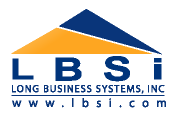Long Business Systems, Inc. (LBSi) Explains How Modern ERP can get all departments on track
Industry: Apps & Software
Today, small and midsized business (SMB) have few excuses to continue their reliance on manual and inefficient processes within any of their major functional areas.
Cleveland, Ohio (PRUnderground) March 31st, 2017
This post highlights how modern ERP helps each of the major functional departments within a company – finance, inventory, operations, and sales and marketing – get, and stay, on track.
One Data Set for All Departments
The value of having every department work from the same set of data is what drives the design of a robust ERP system. If everyone knows the same information and can trust that information, every department can stay updated and ready to react to the needs of the company.
Sales
Many SMBs view sales as the primary driver for most major business decisions. Modern ERP software, like SAP Business One, reflects this reality by priming and streamlining the sales order process with relevant and critical company-wide data. When taking sales orders, the ERP system users can ensure that fulfillment will happen as needed, instantly check for component availability, and create purchase or production orders to satisfy their needs. As they do, the ERP system automatically updates the sales order scheduling board and sales order shipping schedule. The result is that disconnects between order fulfillment and sales ordering become a thing of the past.
Inventory (Material Planning)
From an inventory management standpoint, a robust ERP system ensures that a company’s warehouses have what they need when they need it – without carrying too much stock. By leveraging the same data the sales department sees, inventory managers can integrate their material planning with production order scheduling via the system. An order recommendation workbench lets them view requirements and create supply documents. And, to be further prepared, they can run ‘what if’ scenarios around materials requirements simply by adjusting item numbers, quantities, and due dates. When combined with advanced warehouse planning (e.g., forecasts, safety stock, planned versus actual, etc.) and cross-warehouse distribution views, this feature makes managing inventory easier than ever.
Operations (Labor and Machine Data Collection)
It’s critical for SMBs to understand how efficient their operations are, both overall and product-specifically, and modern ERP software delivers the insights necessary to make understanding operations possible for all businesses. The ability to clock on and off production orders means you can charge labor to a production order just as you would for component materials and machine times. It also means you can compare/contrast the various products you make and how much labor and machine resources each consumes. The intuitive reporting within ERP makes viewing operational efficiency by product, personnel, or line of products a reality.
Finance
The advances in financial reporting in modern ERP software are so vast that we could dedicate a hundred posts to them. As such, let’s examine a few new capabilities necessary for an increasingly international impact on the business. The features go beyond the automatic financial report generation, one-click journal entry creation/search, and flexible chart of accounts setup.
A modern ERP system handles international financial reporting standards (IFRS) with ease. This is important for SMBs trying to get a handle on using the parallel general ledger accounts necessary for reporting in both local and IFRS standards. Modern software facilitates recording and reporting in parallel and then provides the reports for creating financial statements that adhere to IFRS standards. In addition, today’s ERP systems enable you to adjust for exchange rate differences or fluctuating exchange rates. Items can be viewed in foreign currencies and manipulated based on the corrective action your team views most appropriate.
A robust ERP system also allows for multi-dimensional cost centers, which allows you to analyze your business based on the way your company works. Your finance team can structure cost centers in various hierarchies to make reporting more accurate and visible at deeper levels of detail.
One Data Set for All Decisions
As each of your organization’s departments works from the same set of data, each can do its job more efficiently and more accurately – and with minimal inter-departmental interaction. In the past, people from different departments would need to manually double-check, or even triple-check, the data with one another to ensure they were doing their individual jobs correctly. A modern ERP system removes the need for such checks and streamlines the ways departments get on track.
To learn how a modern ERP system, like SAP Business One can help make your individual departments more effective and efficient, contact LBSI today.
About Long Business Systems, Inc.
You want a partner that will help you apply technology to solve the challenges that today’s fast-paced global marketplace has created. We understand and have personal experience with the diverse demands that manufacturers, distributors and service organizations face.
Our clients keep pace with large global companies by applying affordable technology to streamline operations, act on timely information, and accelerate profitable growth. Let us help you intelligently apply technology to your business challenges.
LBSi has been helping clients with technology and business process improvement since 1989.



